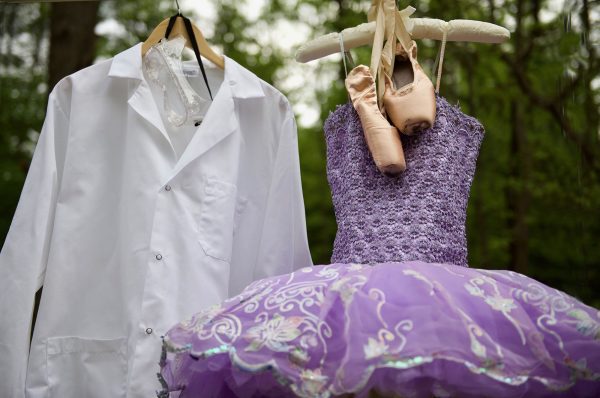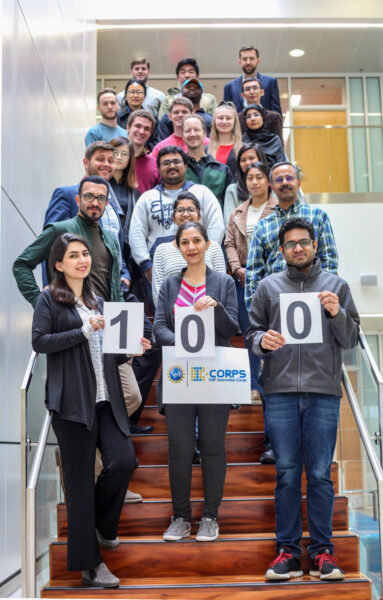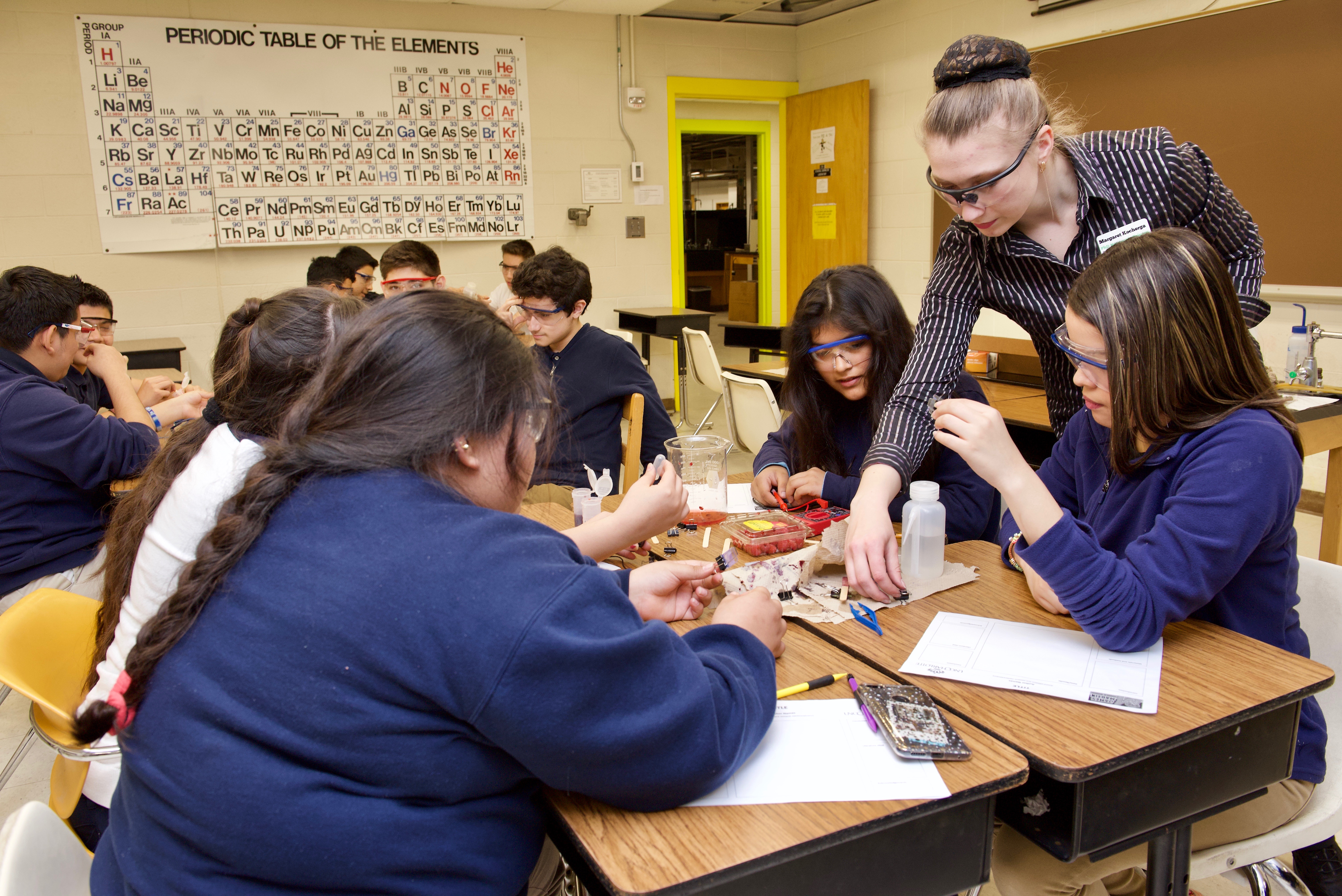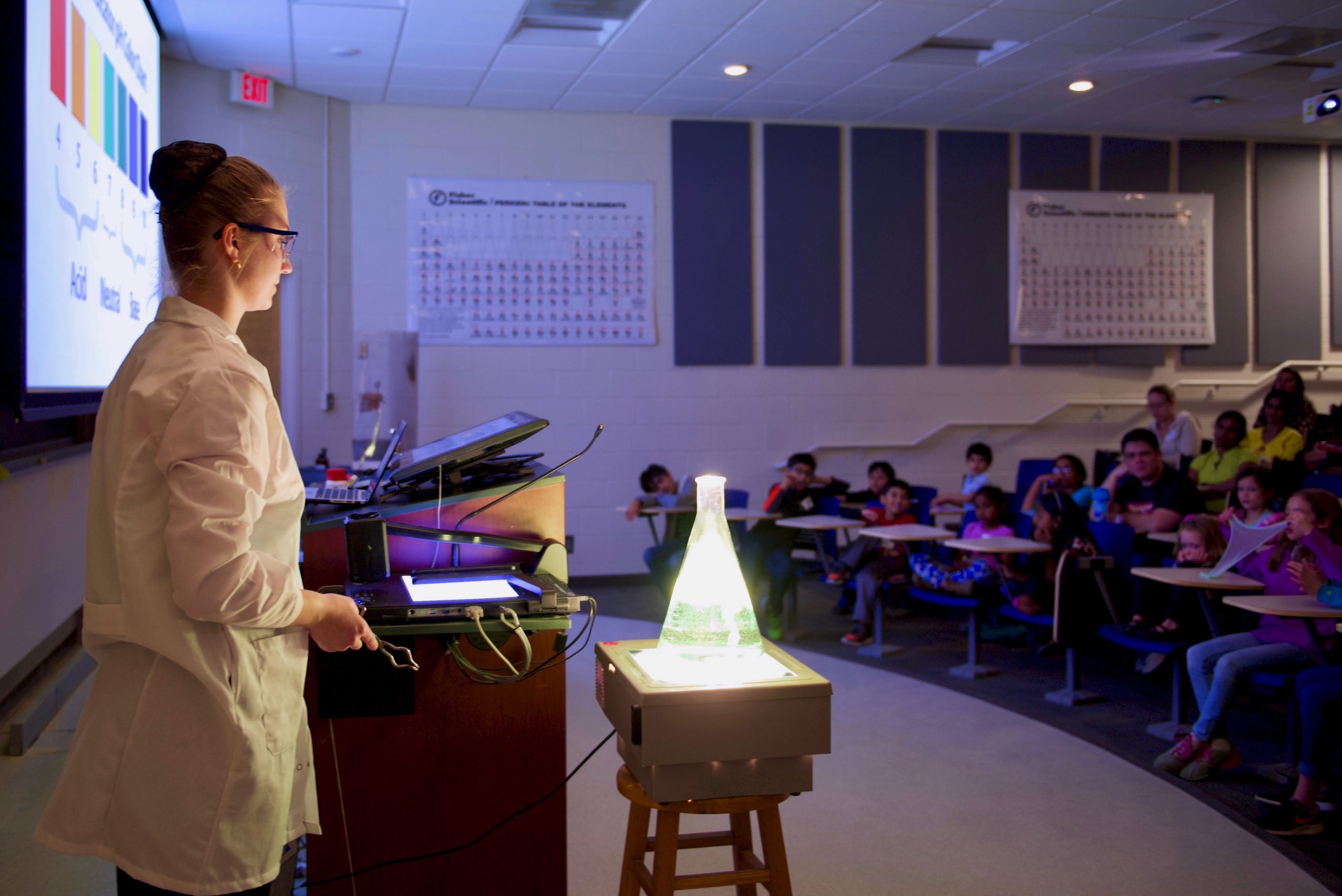Doctoral Student Forms Bonds Through Chemistry, Dance

Margaret Kocherga’s Instagram comes alive through the vivid photos and videos she posts, illustrating her life as a student in the Nanoscale Science Ph.D. Program at UNC Charlotte.
Her posts show Kocherga conducting experiments, presenting at conferences on STEM topics, leading chemistry workshops with audiences of all ages, collaborating with colleagues, teaching college labs, slogging through late-night homework – and dancing.
She even occasionally shows up en pointe around campus wearing a lab coat – all in the interest of debunking stereotypes about scientists and artists.
While her social media posts illustrate diverse settings, activities and even wardrobe choices, a closer look reveals consistent threads. Her story is one of a young scientist and artist who is making connections and encouraging others; discovering and sharing knowledge; and keeping a sharp eye on a dizzying array of daily tasks.
One thing Kocherga emphasizes through her posts is that mistakes, rejections, and setbacks happen to us all.
“There is often a perfectionism stigma, in which people feel like things must be perfect,” she says. “It puts a lot of mental pressure on people, so that’s one thing I want to show, that not everything gets done. I want to show that there are a lot of things that work out well, such as in my research projects, and then some things don’t work, and I don’t get results for a month, and I’m frustrated.”
Perseverance and Versatility
For chemistry Professor Thomas Schmedake, who mentors Kocherga in his lab, her focus on pushing forward through adversity is a great strength.

“The two qualities I value most in Margaret as a scientist are her incredible perseverance and versatility,” Schmedake says “She has demonstrated an exceptional capacity for both, as she has propelled the development of our research program from the concept phase, through proof-of-concept, to the brink of commercialization.” Kocherga is a critical element in a research collaboration that has brought together:
- Synthesis and modeling breakthroughs from the Schmedake lab,
- Developments in organic electronic device fabrication from Michael Walter’s chemistry lab,
- Expertise in thin-film and device characterization and engineering from Yong Zhang’s lab in the Department of Electrical and Computer Engineering in The William States Lee College of Engineering, and
- Physics and optical science expertise from Tino Hofmann and others.
“Margaret is the truly exceptional graduate student who is able to leverage the expertise of these groups to achieve an interdisciplinary breakthrough in the field of organic electronics, which her recent manuscript in Chemical Communications highlights,” Schmedake says.
A dozen UNC Charlotte faculty and students from diverse disciplines are collaborators on the project and authors on the paper, with Kocherga as lead author. The team is synthesizing silicon complexes for electron transport and electroluminescence applications, to enhance operational lifetimes, increase device efficiency, and lower device costs.
One potential use for these stable, non-toxic, and lightweight materials is for bendable health-monitoring wearable devices. Use in cellular phones and computers are other potential applications.
“This was a significant research paper because we demonstrated we can make these new compounds, and we’ve shown the compounds can be applied in the area of light-emitting diodes,” Kocherga says. “We’ve shown that we can get a pixel that lights up and produces light.”
Kocherga is also a key member of a diverse interdisciplinary team that published a paper in August 2019 in the journal Optical Materials Express.

Life lately has been even more of a whirlwind for Kocherga. In one new initiative, she has participated in UNC Charlotte’s Ventureprise Launch NSF I-Corps program as an entrepreneurial lead, exploring the commercial viability of the team’s research. Kocherga conducted 70 interviews with potential customers, funders and competitors as part of the discovery process.
In another accomplishment, in May she received the award for best oral presentation by a student at the 50th North American Silicon Symposium in Columbia, S.C., and she took a first place at the UNC Charlotte Graduate Research Symposium. Earlier in 2019, she earned the Younger Chemists Committee Leadership Development Award from the American Chemical Society.
Engaging the Community
Along with her research, Kocherga takes time to engage the community in science. The National Science Foundation has supported her work with Schmedake and the Charlotte Teachers Institute to build the capacity of 8th grade science classroom teachers, students, and parents at James Martin Middle School.

“Margaret recruited a team of volunteers at UNC Charlotte, including undergraduate and graduate students, to deliver hands-on science demonstrations at a parents’ night at the middle school,” says CTI Executive Director Scott Gartlan. “Margaret gave these parents and students a chance to experience science together in exciting, engaging ways. The students and teachers also visited UNC Charlotte labs to conduct experiments related to their 8th grade curriculum, and they started a first-ever science club at the school.” Kocherga and Schmedake spent time at the school as well.
Kocherga is a long-time leader with UNC Charlotte’s Science and Technology Expo, a public science event hosted by science and technology faculty, staff and students as part of the North Carolina Science Festival. Her popular Colors of Chemistry workshop gives children and families a chance to experience hands-on science.

Shared Attributes
She also squeezes in time to dance and to teach dance, and she fields questions from students and parents about how science and the arts interrelate. The ability to deal with unexpected results and setbacks serves scientists and artists well, as do spontaneity, creativity, and communication skills, she tells them.
“In both fields, you have to make quick decisions,” she says. “You have to think fast, in a sometimes high-stress environment. I must be precise with science, just as I must with dance. I must have a great memory in science, just as I must in dance.”

Kocherga developed her love of dance as a child at her mother’s dance studio in Ukraine. When she was 15, her family moved to Charlotte, and she continued dancing professionally. Soon after, she tore her ACL, making her dream of a professional career as a dancer more difficult.
After finishing high school at age 16, she enrolled at Central Piedmont Community College. There she met chemistry instructor Michelle Esancy, and with Esancy’s encouragement, she began to see a career in STEM as an option. As she prepared to transfer to UNC Charlotte for her junior year, she found a place in Daniel Rabinovich’s chemistry lab. Soon after, she was chosen for the intensive Charlotte Research Scholars undergraduate experience, researching the toxicity of mercury in biological systems. Those experiences inspired her to pursue her doctoral degree and deepen her research. She has also continued to support CRS, working with undergraduates who have come behind her.
“One main thing I’ve learned from my mentors is to always try things,” she says. “Don’t be closed-minded. Don’t be afraid to try things you don’t know. Always have an open mind, and listen to others. That’s something I have learned – listen to everything and everybody, and then decide what’s the best for you. You can’t confine yourself to a box. You have to go out there and explore.”
Words and Images: Lynn Roberson